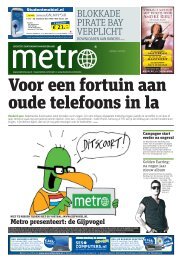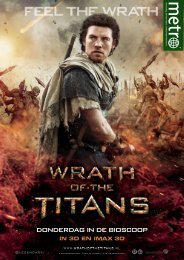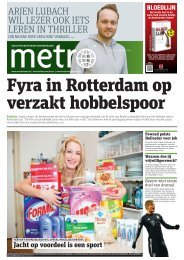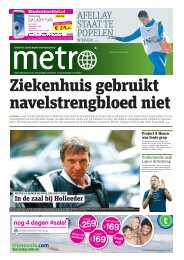Winnipeg BIZ highlights the heart of the city - Metro
Winnipeg BIZ highlights the heart of the city - Metro
Winnipeg BIZ highlights the heart of the city - Metro
Create successful ePaper yourself
Turn your PDF publications into a flip-book with our unique Google optimized e-Paper software.
Smart meter measurements are more accurate, resulting in water bills that better reflect actual use. This will allow customers to fully understand how <strong>the</strong>ir household activities — including<br />
watering <strong>the</strong> garden and doing laundry — impact <strong>the</strong> bottom line. Veer photos<br />
Kerry<br />
FreeK<br />
Water Canada<br />
In <strong>the</strong> old days, you received<br />
a water bill — likely one<br />
based on a flat rate — and<br />
paid it, no matter how much<br />
water you used.<br />
If your <strong>city</strong> had meters —<br />
more than one-third <strong>of</strong> Canadian<br />
households still don’t<br />
— you might be billed for<br />
<strong>the</strong> actual volume <strong>of</strong> water<br />
you consumed, but it would<br />
be too late to understand and<br />
adjust your consumption patterns.<br />
Not only that, it might<br />
take several billing cycles to<br />
figure out if your home had<br />
a pesky, water-wasting leak.<br />
“For years, it’s been<br />
‘get water bill, pay bill, get<br />
UW 6<br />
Tapping into smart billing<br />
Next evolution. Smart meters are changing <strong>the</strong><br />
way Canadians are thinking about water use<br />
water, consume water,’” says<br />
Norm Daigle, executive vicepresident<br />
<strong>of</strong> Harris Utilities<br />
SmartWorks.<br />
The next evolution<br />
— smart metering — is<br />
changing <strong>the</strong> way Canadians<br />
think about <strong>the</strong>ir consumption.<br />
With smart meters, measurements<br />
are more accurate,<br />
resulting in bills that better<br />
reflect actual use. Savvy utilities<br />
are taking things one<br />
step fur<strong>the</strong>r, making those<br />
bills transparent and accessible<br />
in near real-time, so customers<br />
can fully understand<br />
how <strong>the</strong>ir household activities<br />
impact <strong>the</strong> bottom line.<br />
Harris Utilities is one<br />
company that <strong>of</strong>fers dynamic<br />
metering and billing servi-<br />
Focus on urban water<br />
ces. With <strong>the</strong>ir s<strong>of</strong>tware,<br />
utilities can provide customers<br />
with online reports<br />
that display details<br />
about <strong>the</strong>ir consumption<br />
patterns so <strong>the</strong>y can<br />
monitor and adjust use accordingly.<br />
Customers can play<br />
with <strong>the</strong> data, creating<br />
scenarios that<br />
demonstrate how<br />
performing different<br />
activities<br />
at different<br />
times might save<br />
money. They<br />
can compare current<br />
use to years,<br />
months, and even<br />
days prior.<br />
Some utilities<br />
even<br />
<strong>of</strong>fer a<br />
tool to<br />
compare<br />
use to similarhouse-<br />
holds, and provide<br />
tips on how to<br />
use water more<br />
efficiently and<br />
economically.<br />
Utilities are<br />
also breaking<br />
down water use<br />
in more<br />
meaningful measurements.<br />
“With mobile phone billing,<br />
we know what a minute<br />
means,” Daigle says. “But<br />
what’s a cubic metre? Is it<br />
equivalent to watering my<br />
lawn? Feedback like that<br />
helps customers better<br />
understand <strong>the</strong>ir water use.”<br />
Ultimately, smart metering<br />
is about empowering<br />
<strong>the</strong> consumer. Gone are<br />
<strong>the</strong> days <strong>of</strong> <strong>the</strong> flat rate and<br />
vague bills.<br />
“Dynamic billing brings<br />
<strong>the</strong> customers into<br />
<strong>the</strong> picture,” Daigle<br />
says. “At <strong>the</strong> end<br />
<strong>of</strong> <strong>the</strong> day, it’s<br />
customers who<br />
are making <strong>the</strong><br />
decision to turn<br />
<strong>the</strong> taps on or <strong>of</strong>f.<br />
They should be participants<br />
in achieving<br />
conservation objectives<br />
— that’s <strong>the</strong><br />
sweet spot.”<br />
metronews.ca<br />
Wednesday, June 12, 2013<br />
Game<br />
<strong>of</strong> thirst<br />
Water scar<strong>city</strong> and severe<br />
droughts bring big conflicts<br />
to cities, but most<br />
<strong>of</strong> us aren’t ready for<br />
such events, and some<br />
don’t even want to think<br />
about it.<br />
So how do you engage<br />
people on such a serious<br />
topic? Make it fun, but<br />
keep it meaningful.<br />
Last fall, British Columbia’s<br />
Okanagan Water<br />
Basin Board (OBWB)<br />
proved it had <strong>the</strong> right<br />
idea. In partnership with<br />
Agriculture and Agri-Food<br />
Canada (AAFC) and <strong>the</strong><br />
B.C. Ministry <strong>of</strong> Environment,<br />
OBWB brought<br />
toge<strong>the</strong>r key players in<br />
government, as well as<br />
regional water suppliers,<br />
and reps from <strong>the</strong><br />
agriculture, fisheries, and<br />
ranching communities<br />
to participate in a game<br />
about municipal thirst.<br />
Facing drought is a<br />
growing necessity. In <strong>the</strong><br />
United States, drought<br />
ranks second or third<br />
<strong>of</strong> natural disasters,<br />
depending on <strong>the</strong> year,<br />
in terms <strong>of</strong> economic<br />
impact. In Canada, dry<br />
periods are becoming<br />
more frequent and prolonged.<br />
In <strong>the</strong> game, teams<br />
considered several scenarios<br />
with varying degrees<br />
<strong>of</strong> drought, quickly<br />
learning that any choice<br />
would impact water<br />
supply and, depending<br />
on how <strong>the</strong> scenarios are<br />
managed, could increase<br />
or reduce conflict within<br />
<strong>the</strong> community.<br />
They also learned success<br />
comes down to collaboration,<br />
says Nelson<br />
Jatel <strong>of</strong> OBWB.<br />
“In <strong>the</strong>se situations,<br />
it’s critical to communicate<br />
clearly and work<br />
toge<strong>the</strong>r. The game<br />
allowed us to think<br />
through some <strong>of</strong> <strong>the</strong><br />
complex partnerships<br />
that are key to surviving<br />
a drought.” Kerry FreeK

















